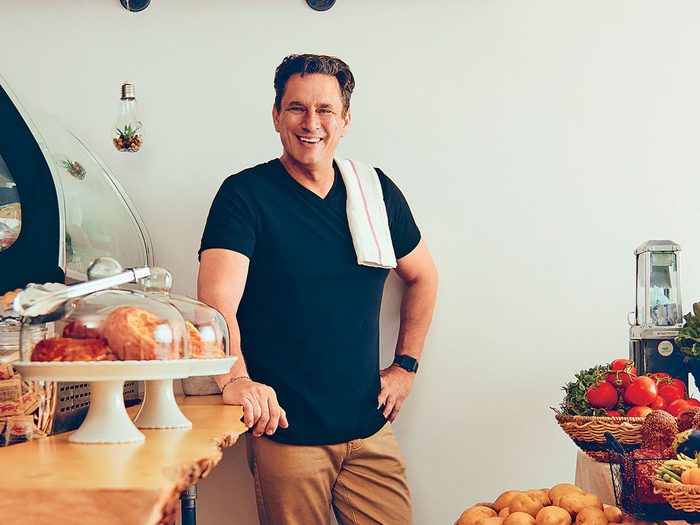This Toronto Charity Feeds Thousands with Surplus Restaurant Food

Jagger Gordon founded Feed It Forward to divert food destined for the landfill. Since COVID-19, he's been feeding 5,000 people daily in Toronto.
Jagger Gordon was standing in line at the grocery store in late March when it hit him: this was only the beginning. The 50-year-old chef and founder of Toronto’s Feed It Forward, one of the country’s most innovative food bank programs, saw that COVID-19 would have an even bigger impact on communities that depend on his services. “People were fighting over water,” he says, “and I just thought, okay, this is going to be bad.”
Gordon is like a modern-day Robin Hood, only instead of robbing from the rich, his food bank rescues food that would otherwise be destined for landfills. He launched Feed It Forward six years ago, hoping to ameliorate hunger by making a dent in the approximately 11 million tons of food that Canadians annually let go to waste. The food he rescues is still edible but may not meet the picture-perfect standards of consumers. Don’t even get Gordon started on overly aggressive best-before dates. “This is perfectly good stuff!” he says. “Maybe a pepper has a slight blemish, or it’s not breast meat or whatever the desired cut is, but you can still make something that tastes amazing.” Operating out of three main kitchens with some 2,200 volunteers, the organization was, until recently, feeding approximately 3,000 people every day. Since COVID, it’s closer to 5,000.
Feed It Forward runs a pay-what-you-can restaurant and grocery store stocked entirely with hand-me-downs from Whole Foods (some 400 kilograms every day). Thirty-two Toronto-area restaurants and food supply companies—Sysco, for example—also help out. On 200 acres in Whitby, Ont., Feed It Forward grows produce and hosts grow-your-own-food lessons for individuals and families. If the pandemic hadn’t cancelled in-person classes, this fall would have meant resuming Soup Bar, an offshoot program that provides free hot meals to students at Humber College (more than a third of post-secondary students live with food insecurity). People have an idea of what a person who is hungry looks like, says Gordon, but it’s so much more prevalent than we realize.
Hunger Gains
Feed It Forward couldn’t exist if the Ontario government hadn’t passed 1994’s Donation of Food Act, which allows individuals and companies to provide organizations with excess or unused stock without fear of liability. But Gordon says we can still do better. In France, for example, it’s illegal for large supermarkets to throw away food that could otherwise be donated. In 2016, Canada’s NDP agriculture critic Ruth Ellen Brosseau introduced a private member’s bill to develop a national strategy on food waste, but it was defeated.
Experts predict the number of people who are food insecure to have doubled this year—but Gordon hopes that the spotlight the pandemic has put on food distribution systems and scarcity will lead to meaningful change. In the early days of the lockdown, Gordon heard from staff in the kitchens at Rogers Centre, the CN Tower, the Ontario Food Terminal and hundreds of other businesses—all of them had food to give and knew Gordon was the guy who would know what to do with it.
As the year came to an end, Feed It Forward was stockpiling turkey. In previous years, the organization hosted holiday dinners—community celebrations with live music and, of course, plenty of good food. This year will be different—less gathering and more special deliveries. So maybe Gordon is less like Robin Hood and more like Santa. “There is need out there, and we can meet it,” he says. “That’s my mission.”
Next, read about how this doctor helps breast cancer patients prepare for treatment.



